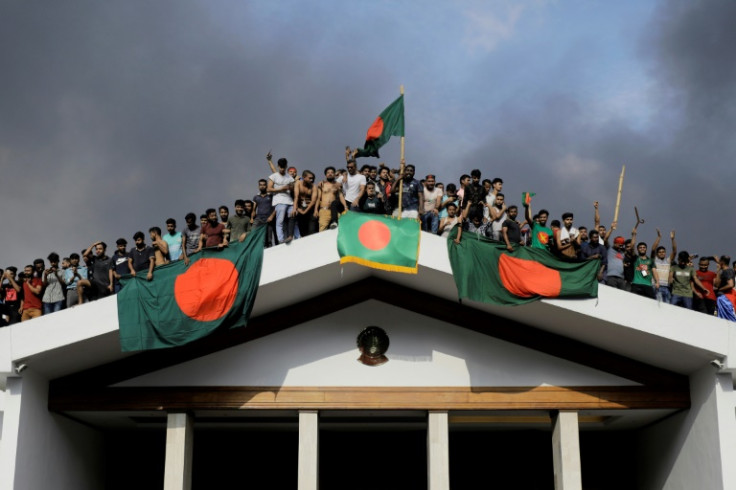Western Powers Urge Bangladesh Calm, Democratic Transition

Western powers called Monday for calm in Bangladesh after long-ruling leader Sheikh Hasina fled, with the United States saluting the military for forming an interim government rather than cracking down further on protesters.
Sheikh Hasina, who had particularly close relations with regional power India, enjoyed a mostly cooperative relationship with the West during her 15 years in power but had increasingly drawn criticism for her authoritarian turn.
The United States called on all sides in Bangladesh to "refrain from further violence" as bullet-ridden bodies were strewn across hospital floors and looting swept the capital Dhaka.
"Too many lives have been lost over the course of the past several weeks, and we urge calm and restraint in the days ahead," State Department spokesman Matthew Miller told reporters.
Hasina, the daughter of Bangladesh's founding father, had sought to quell a nationwide uprising that started with student-led protests against job quotas. Nearly 100 people were killed on Sunday as calls grew for her to step down.
Miller said that the United States had seen reports that the army refused pressure to crack down further on student-led demonstrations.
"If it is true in fact that the army resisted calls to crack down on lawful protesters, that would be a positive development," he said.
"We welcome the announcement of an interim government and urge any transition be conducted in accordance with Bangladesh's laws," he said.
Asked if the military should choose the next leadership, Miller said, "We want to see the Bangladeshi people decide the future Bangladeshi government."
UN Secretary-General Antonio Guterres called for a "peaceful, orderly and democratic transition" as well as a "full, independent, impartial and transparent investigation into all acts of violence," his spokesman Farhan Haq said.
Bangladesh's former colonial power Britain called for the United Nations to take the lead in an investigation.
"The people of Bangladesh deserve a full and independent UN-led investigation into the events of the past few weeks," Foreign Secretary David Lammy said in a statement.
The European Union also called for "calm and restraint."
"It is vital that an orderly and peaceful transition towards a democratically elected government is ensured, in full respect of human rights and democratic principles," EU foreign policy chief Josep Borrell said.
Canada's Foreign Minister Melanie Joly said her country "condemns the human rights violations, deaths, torture, arbitrary arrests and lethal force" used in response to the protests.
"During this transition, we urge all parties to respect and uphold democratic institutions and processes and the rule of law," Joly said in a statement.
There was no immediate reaction from regional governments to the fall of Hasina, who had sought a delicate balancing act of enjoying support from India while maintaining strong relations with China.
Indian media said that Hasina flew to a military airbase near New Delhi.
A top-level source said she wanted to transit on to London, but it was unclear if she would be allowed.
The United States in the past praised Hasina's economic track record and saw her as a partner on priorities such as countering Islamist extremism and sheltering Rohingya refugees fleeing persecution in Myanmar.
But Washington more recently criticized her for autocratic tendencies and imposed visa sanctions over concerns on democracy.

© Copyright AFP 2025. All rights reserved.





















